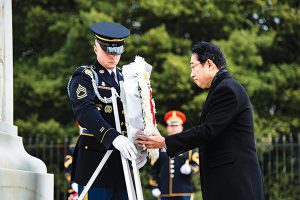Bloomberg
Japanese Prime Minister Fumio Kishida is looking beyond his country’s alliance with the US to deter China, bolstering security ties with democracies from Australia to Europe.
On his tour of Group of Seven countries last week, which came after the biggest overhaul of Japan’s security policy since World War II, Kishida told French President Emmanuel Macron that the security of Europe and the Indo-Pacific were indivisible. He signed a deal on mutual troop access with UK premier Rishi Sunak and agreed with Italian leader Giorgia Meloni to upgrade defense ties.
Japan’s alliance with Washington — complete with its “nuclear umbrella†— remains the cornerstone of its strategy, and US President Joe Biden endorsed the country’s more robust security strategy in a meeting with Kishida at the White House on Friday. Yet Japan’s deepening unease about the dangers in its neighborhood has prompted a fresh push to build a bulwark of other partnerships.
Concerns linger in Japan that Biden could be succeeded by a less sympathetic US leader, said Euan Graham, a Singapore-based senior fellow for Indo-Pacific Defence and Strategy at the International Institute for Strategic Studies. Donald Trump, for instance, repeatedly questioned the fairness of the US-Japan alliance during his years as president.
“They can’t rely on the US entirely, both for political reasons and in simple scale terms,†Graham said. “They need extra help, and that’s where Canada and the other G-7 countries come into play.â€
Russia’s invasion of Ukraine, North Korea’s growing missile prowess and rising tensions around Taiwan — including Chinese military exercises that involved lobbing missiles into waters near Japan — have all contributed to its concerns. Last year Kishida became the first Japanese prime minister to attend a NATO summit.
On each stop of his five-country tour, Kishida explained Japan’s defense expansion and regional security worries. It culminated with a joint US-Japan statement that blamed China and North Korea for making it necessary to ramp up the nation’s military capability.
“In managing relations with China, it is absolutely necessary for Japan, the US and Europe to work together as one,†Kishida said in a speech at the Johns Hopkins University School of Advanced International Studies in Washington on Friday.
China Foreign Ministry spokesman Wang Wenbin criticized the cooperation between Tokyo and Washington. “Japan and the US, colluding with each other, have staged a farce to smear China’s image, interfere in China’s internal affairs and suppress China’s development,†Wang said at a regular press briefing in Beijing on Monday.
European allies are increasingly conscious of the growing security threat China poses in a variety of arenas, particularly in the long-term, and are taking steps to address that. Macron highlighted security as one area where they can increase cooperation with Japan when he met Kishida last week, as they looked to a new round of joint military exercises.
Germany and the Netherlands have, along with Japan, the U.S. and the UK, sent frigates to sail in the South China Sea in recent years as a way to counter China’s claims there and underscore the importance of freedom of navigation.
The North Atlantic Treaty Organization, which includes the US, Canada and European members, for the first time mentioned China in its 2022 Strategic Concept, laying out the alliance’s priorities for the coming decade. Nato leaders agreed at their summit last June, also attended by Asia-Pacific partners like Japan and Australia, that China posed a “systemic challenge†and warned about a deepening strategic partnership between Beijing and Moscow.
Eagerness to get involved with a wider range of partners manifested itself in last year’s decision to work on a next-generation fighter jet with the UK and Italy, rather than with the US.
 The Gulf Time Newspaper One of the finest business newspapers in the UAE brought to you by our professional writers and editors.
The Gulf Time Newspaper One of the finest business newspapers in the UAE brought to you by our professional writers and editors.
